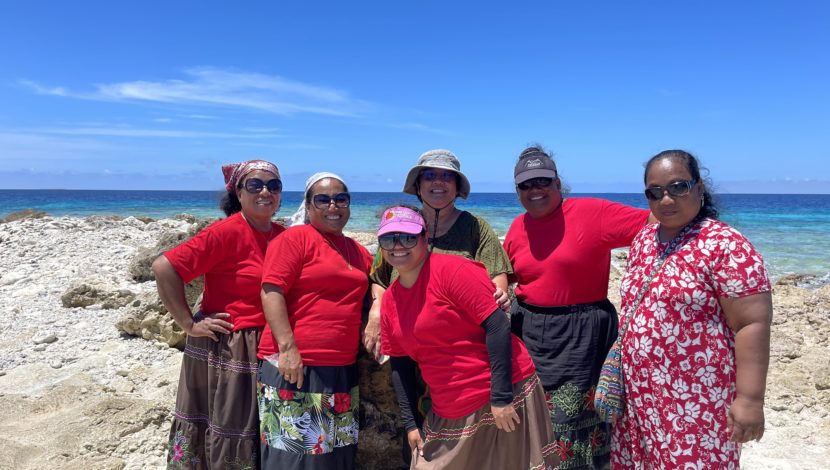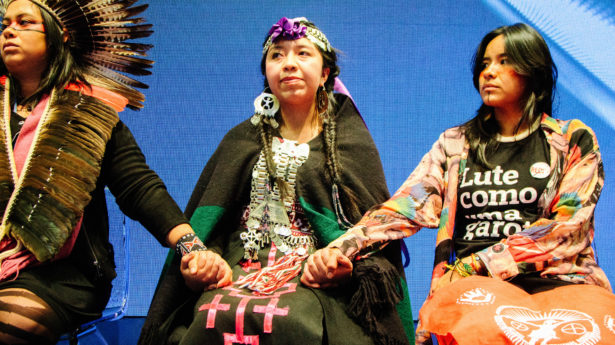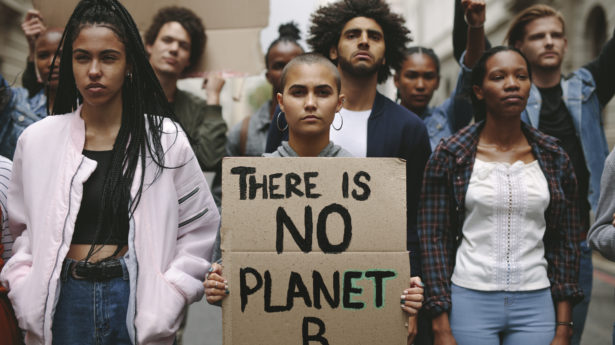The Unitarian Universalist Service Committee advances human rights through grassroots collaborations.
Less Talk, More Action: 5 Takeaways from the Pacific Climate Justice Summit

By Salote Soqo on August 13, 2021
On August 3 and 4, the Pacific Climate Justice Summit brought together hundreds of climate activists from various sectors of the Pacific community to discuss the Pacific’s strategy at COP26 (the United Nations’ annual Climate Change Conference) and beyond. The message was clear: Climate justice in the Pacific is the defining movement of our current and future generations.
The opening plenary theme on Just Transition and COVID-19 grounded the summit on the most pressing issues of the past year—COVID-19 and the climate crisis. COVID-19 has forced many island nations into lockdown, isolating communities in climate-sensitive and vulnerable situations. The summit included other themes that touched on issues the Pacific was grappling with: gender justice and sustainable development, intersectionality, loss and damage, climate finance, nature-based solutions for climate change, oceans, and the use of international human rights mechanisms.
Here are some takeaways from this powerful summit, inspiring reflection on many of the human rights issues that UUSC’s partners and allies work on and contend with on a daily basis.
1. Grounding Action in Spirituality and Justice
James Baghwan, an ordained Minister at the Pacific Conference of Churches, grounded us in justice from a Christian and spiritual perspective:
“For Pacific Christians who make up approximately 90 percent of our Pacific households, justice is a Christian imperative. Justice is at the heart of all the faiths and spiritualities that have taken root in our diverse Pacific communities. Such justice is manifested in radical generosity, universal equality, significant, life-changing advocacy…Any recovery from COVID-19 must incorporate these facets of justice, and in the face of the climate crisis, must not neglect climate justice and environmental stewardship. In the face of climate-induced migration, and land and sea exploitation and degradation, this is perhaps the biggest challenge facing the Pacific today.”
2. Listen to the Youth
As UUSC is an international human rights organization, it was particularly inspiring to learn about the efforts of the Vanuatu-based Pacific Islands Students Fighting Climate Change (PISFCC) and their campaign to seek an Advisory Opinion from the International Court of Justice. In their own words, the campaign seeks to take the world’s largest threat to human rights to the world’s highest court of justice, building on past precedents that were also led by the Pacific Island Countries of Palau and the Marshall Islands, to seek an Advisory Opinion from the court on climate change.
PISFCC’s campaign director, Solomon Yeo, drew an analogy of the ICJ’s role to how matters are addressed in traditional settings: “When we need clarity on issues, we seek the counsel of our elders. Their opinion carries weight….That is what we’re seeking from the world’s highest court, an opinion that will carry the weight of the court which we will use to fight climate change.”
Additionally, Sevuloni Rokomatu Ratu from the Pacific Resiliency Partnership youth working group highlighted the critical role of youth perspectives, and the importance of engaging youths in climate negotiations, sharing that a multi-stakeholder strategy is needed for an inclusive COP at the national and regional level.
3. Black Lives Matter in Climate Justice
I was honored to moderate the closing plenary of the Summit, “Building our Shared Vision: COP26 and Beyond.” The panelists were articulate about the need to focus on having a coordinated regional approach, while working to dismantle the systems that create the inequities that shape the crisis the region is experiencing.
Raijeli Nicole, from Oxfam in the Pacific, grounded the panel on ensuring that our vision is focused on future generations and the need to address the inequities that the Pacific faces, particularly in accessing global climate finance. Raijeli inspired us to acknowledge that Black Lives Matter in COPs, reminding us that the systemic conditions that have required this movement for Black lives need to be at the forefront of the Pacific’s climate justice movement.
4. The Power of Frontline Voices
Cameron Diver from the Pacific Community reminded the audience about the power of our voices as Pacific peoples in climate negotiations: “The Pacific’s voice is grounded in evidence – scientific, direct experiences and traditional knowledge – that is critical in COP spaces,” and reminded the audience of the important role in shaping the negotiations: “The Pacific played an important role in catalyzing the climate justice movement, beginning back in 1992 at the Rio Summit and in the creation of the Paris Agreement.”
5. Intersectionality at the Forefront
Our session ended with Sharon Baghwan-Rolls from Shifting the Power Coalition, who focused on the intersectionality of climate justice. Sharon highlighted that the region’s climate crisis is foregrounded with a preexisting crisis of gender inequity and political insecurity, and provided clear recommendations for moving forward, including an anti-militaristic approach to addressing human security in the context of climate change, ensuring that political spaces are inclusive, representative and intersectional, ensuring dedicated investments in women and girls, encouraging more South-South collaborative learning, and employing a feminist funding model that supports the agency of women and girls.
Supporting Climate Justice Through International Solidarity
The Pacific Climate Justice Summit was inspiring, and it was a privilege to be witness to it. As an international human rights organization that is committed to dismantling systems of oppression and advancing human rights for all, the Pacific’s message for climate justice in the lead up to COP26 is one that we are proud to support.
In the words of Solomon Yeo: To our global leaders at COP 26, we need “Less fata, more leka” (less talk, more action).
Vinaka! (“thank you” in Fijian)
***
About UUSC: Guided by the belief that all people have inherent worth and dignity, UUSC advances human rights globally by partnering with affected communities who are confronting injustice, mobilizing to challenge oppressive systems, and inspiring and sustaining spiritually grounded activism for justice. We invite you to join us in this journey toward realizing a better future!
Image Credit: Marshall Islands Conservation Society (MICS)

